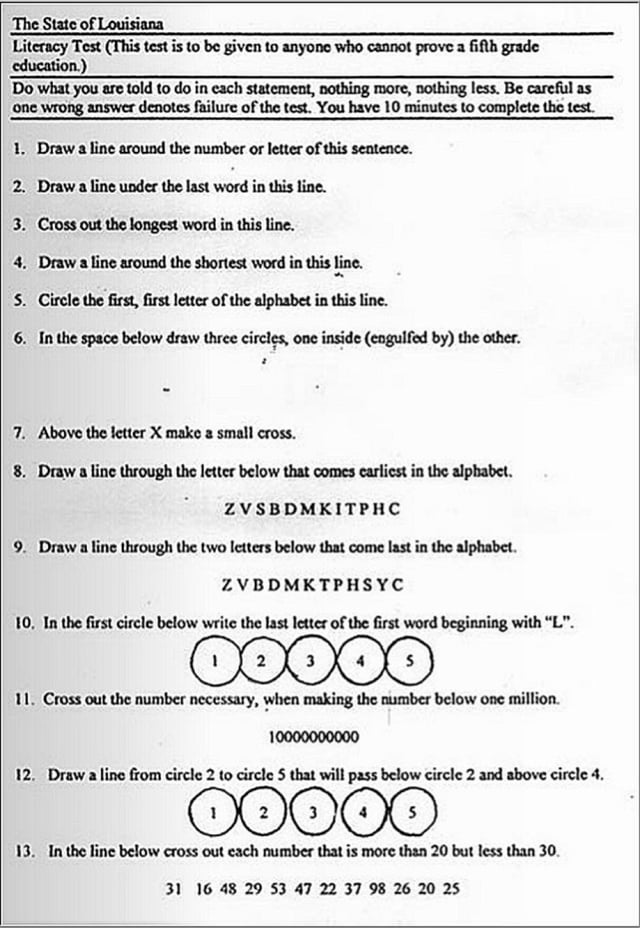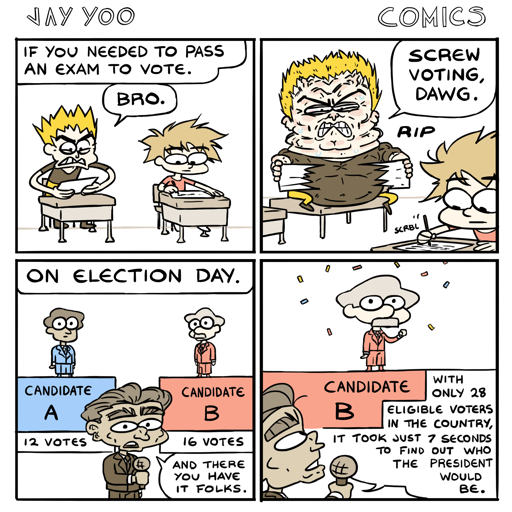If You Needed to Pass an Exam to Vote
-
Yes I did watch a vid about those tests lately. The issue there was that whites did not have to take them. If everyone has to take tests and they are designed sanely that should not be an issue.
The history of our country has shown that so long as people are involved, corruption can occur. There is no test that can be written so sanely that only "the right people" pass.
-
This post did not contain any content.

And the approved voters just happened to be from the 50 people who controlled the testing.
-
This is an example of the gotcha this test did, you can read the question two different ways. Making the number below the question one million, or making the number itself below one million.
Oh, Jesus. I read "below" to mean it was referring to the number directly "below" the instructions. I didn't even consider that it could be read another way. Fuck everything about that test.
-
Who gets to design the test, though?
I think it should be a coin flip. Heads or tails. You lose whichever way it lands. That'll keep the riffraff out.
-
I would assume each question is independent of the others, so probably a T for 'last'
That would be my guess too, but tbh that's the only question I don't feel confident about
-
I'd second this interpretation... least based on my interpretation of "cross out THE NUMBER".
0 is a number.
-
Sure. Disenfranchise most people. That's a suitable hack to a
checks notes
stable, legitimate, and responsive government.Even China would have more political legitimacy than such a system. It would collapse almost immediately.
If you ever want a good example of functionalist ideas leading to absolutely uncritical nonsense, here it is.
Not saying this is the correct route, but I do see the cultural decay, foreign influence, and complete lack of civic duty causing massive political failures in the US in real-time as we grow lazier, less interested, and more content. Any idea how we account for that in a reasonable fashion?
-
It says "more than"
It does, but in common language that could go either way. Especially since it's not the technical phrase "greater than".
-
The founding fathers basically solved this issue through the electoral college, you’re not supposed to be voting for the president, you’re supposed to be voting for the people who will elect the president. But that’s all gone to shit, proving Hamilton’s warnings about populism extremely prescient.
Even if it worked as intended, it just kicks the problem back a step
-
You need to cross out enough zeros so that it makes a million. Pretty sure
Ah, but they can get you because a bunch of zeros isn't "a number".
You could cross out the first 1000000... leaving just the last zero, though.
-
Not saying this is the correct route, but I do see the cultural decay, foreign influence, and complete lack of civic duty causing massive political failures in the US in real-time as we grow lazier, less interested, and more content. Any idea how we account for that in a reasonable fashion?
The problem is looking at it too functionally. You cannot fix it by "fixing" voting as if voting magically creates a functional government. It's a method to derive consensus. You cannot look at a system that is failing to produce consensus and then fix it by directly removing anything that increases consensus. That's insane.
You need to critically look at the entire system and identify what the problem is. In this case it's largely the abstraction layers. People now interact with their government through filters even greater than the old Hearst days. Information flows from media filters to the population and from the population to government through social media filters. And both of those filters have their own agendas. Of course nobody believes the resulting government is responsive or legitimate. It's not.
There are many potential solutions for civic engagement. But that largely means breaking down the very walls that powerful interests have created. There's no easy solution to it. Certainly not "let's make these stupid people unable to vote." A solution is much more radical and takes understanding both what you want to achieve and how the current system is preventing it.
-
I never said tests should be like that.
Voting zones shouldn't be gerrymandered, but they are. Any system that relies solely on humans not acting immorally in their self interest is naive in its conception and doomed to fail. Literacy tests are another example.
-
The problem is looking at it too functionally. You cannot fix it by "fixing" voting as if voting magically creates a functional government. It's a method to derive consensus. You cannot look at a system that is failing to produce consensus and then fix it by directly removing anything that increases consensus. That's insane.
You need to critically look at the entire system and identify what the problem is. In this case it's largely the abstraction layers. People now interact with their government through filters even greater than the old Hearst days. Information flows from media filters to the population and from the population to government through social media filters. And both of those filters have their own agendas. Of course nobody believes the resulting government is responsive or legitimate. It's not.
There are many potential solutions for civic engagement. But that largely means breaking down the very walls that powerful interests have created. There's no easy solution to it. Certainly not "let's make these stupid people unable to vote." A solution is much more radical and takes understanding both what you want to achieve and how the current system is preventing it.
Fair and reasonable. I just don't see a large force that would lead the current us in that direction naturally, and if I did I feel like I'd have more hope for a stable tomorrow.
-
This post did not contain any content.

Nah, the exams wouldn't be mandatory for everyone. You have a degree? Exempt. You graduated from one of the "certified" high schools (the ones in white neighborhoods but we don't call it that wink wink)? Exempt. Passed NRA shooting license exam? Exempt.
-
Also worth pointing out, WHY the test is so bad... 1. obviously not even well educated people today can agree on the meaning of a good portion of the questions.
but the biggest thing is, not everyone had to take them... IE the key point intention was "if a parent or grandparent has ever voted, you can skip this test". which is such a blatant giving away that they don't care of an individuals knowledge, they aren't actually worried if they can read, they were just keeping first generation voters from voting... at a time when in particular a specific subset of american's were in position to be first generation voters.
(black people, particularly)
-
What that actually looked like:

There are two more pages to this and it gets worse
-
It does, but in common language that could go either way. Especially since it's not the technical phrase "greater than".
No, twenty still isn't more than twenty.
-
This post did not contain any content.

If voting needed an exam, they would use that exam to stop certain demographics from voting. And no, I'm not talking about the ignorant.
-
A perfectly designed test - ambiguous enough that anyone subjected to it can be failed.
I still don't know what #11 is "supposed" to be.
Can anyone explain #1 to me? What are you supposed to circle? It says "the number or the letter". There's 1 number and the entire sentence is literally letters...
It's like when the waiter asks "Soup or salad?" and you say "Yes".
-
This post did not contain any content.

This is a bad idea. You would just be creating another layer of gerrymandering.

